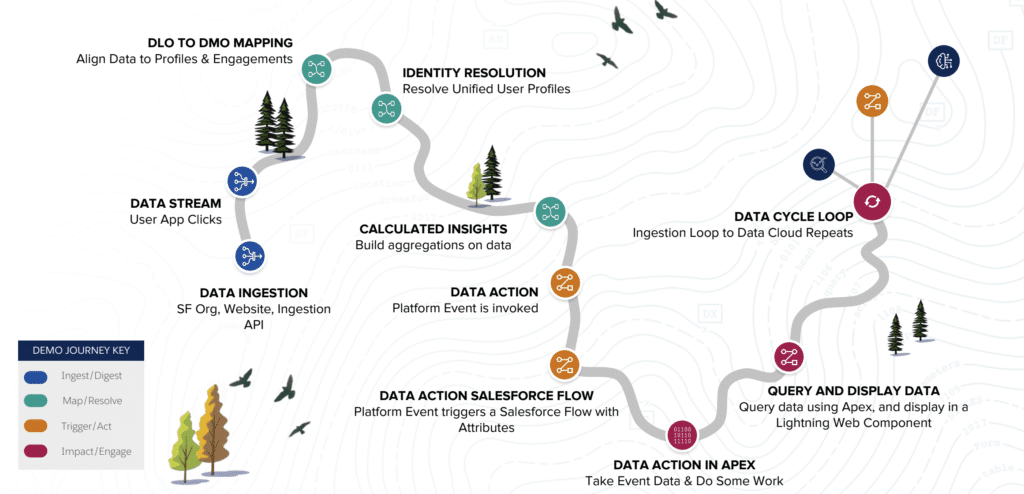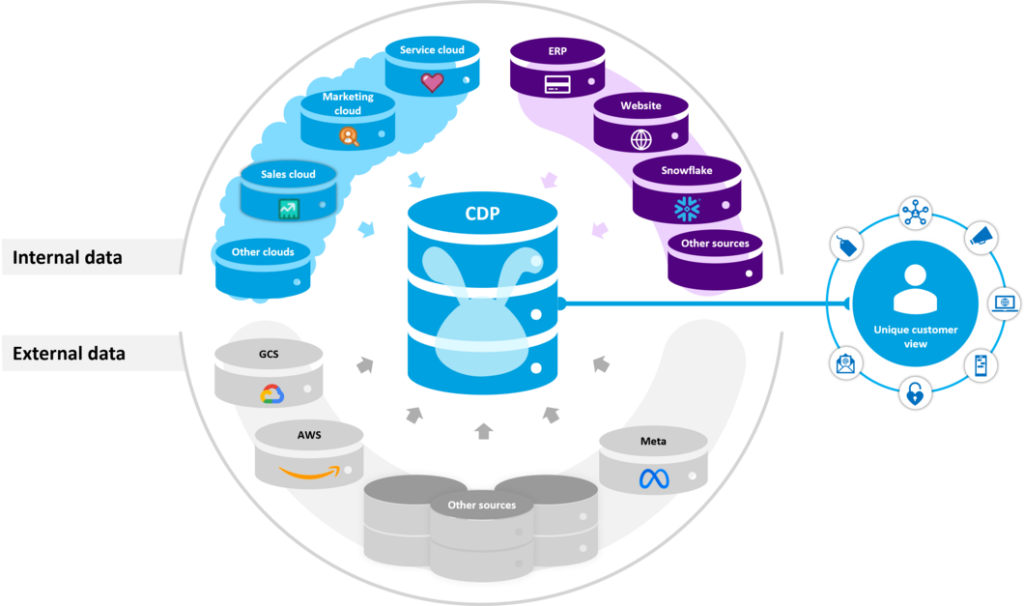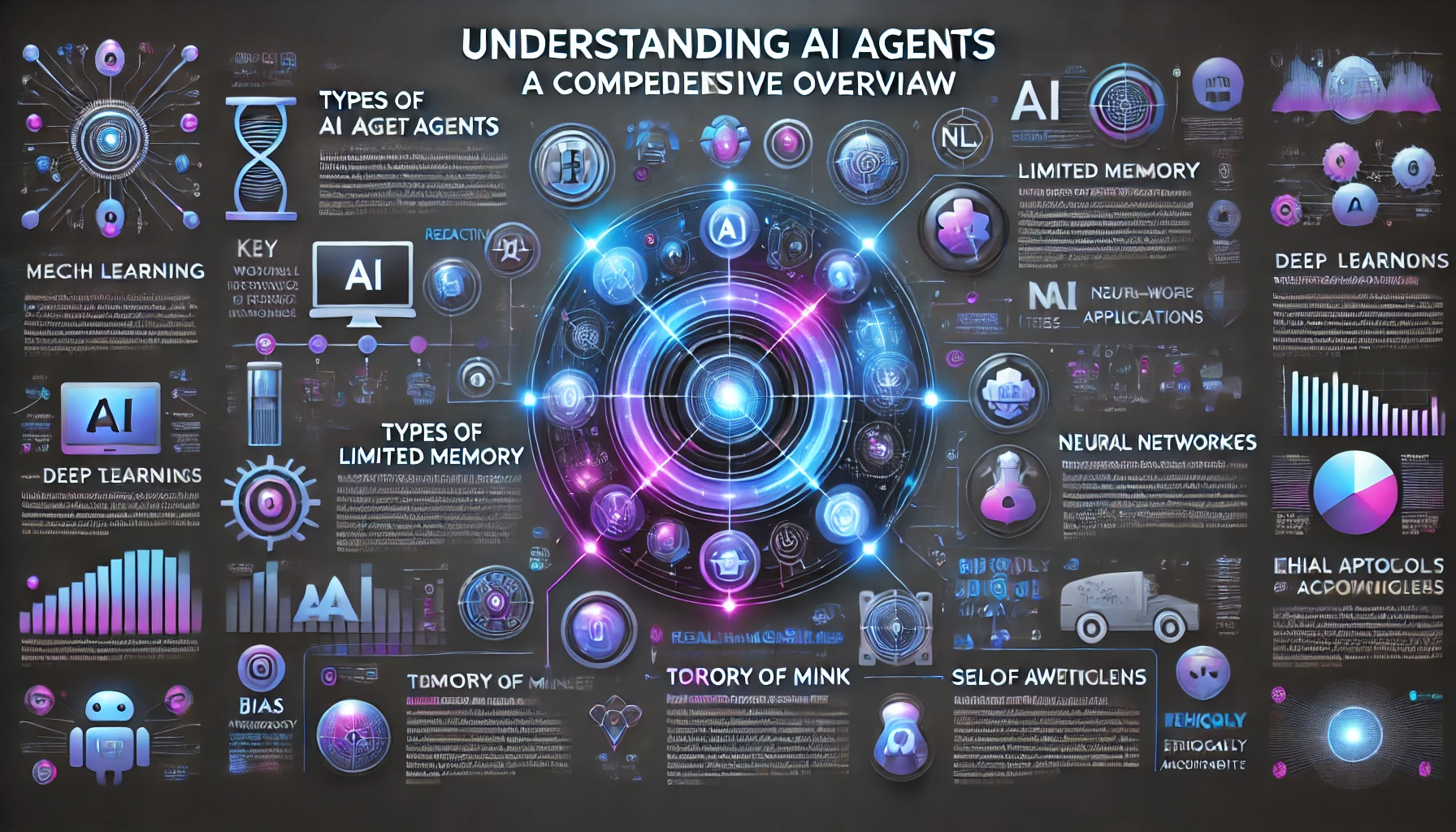Salesforce Data Cloud: Revitalize Your Data
Salesforce Data Cloud is a dynamic and comprehensive real-time data platform that serves as a centralized hub for customer data. It enables businesses to integrate and unify external and internal data sources, creating a single source of truth. Leveraging AI and automation, organizations can extract real-time, actionable insights from unified data. This empowers them to drive enhanced customer experiences across sales, service, marketing, and commerce. Data Cloud’s real-time data enables more powerful automation with Flow and more intelligence with Einstein, all built on the trusted infrastructure of Hyperforce. Now the entire Customer 360 is automated, intelligent, and real time, helping every company save costs, save time, and grow revenue.

Salesforce Data Cloud is a customer data platform (CDP) that unifies customer data from various technologies into a single location. It acts as the backbone connecting different “clouds” within the Salesforce ecosystem. It sets itself apart by being built on Salesforce metadata, enabling seamless integration across clouds, and leveraging familiar features like Flow, APEX, and analytics. The Data Cloud efficiently collects, cleans, and unifies data from diverse sources.
Salesforce Data Cloud, formerly known as Genie, is a dynamic ecosystem that integrates various data sources to provide enterprises with a comprehensive understanding of market trends and consumer insights. By ingesting, storing, and combining real-time data streams with Salesforce data, Genie enables personalized customer experiences. Sales representatives, customer care executives, service desk personnel, and marketing experts can make informed decisions based on real-time information. For example, real-time patient data enables healthcare professionals to offer preemptive advice and care recommendations.

Salesforce Genie sets itself apart from the standard CDP:
Zero-copy architecture: Without transferring or copying data, Genie may access data from data lakes directly and vice versa. As stated differently, information can be retrieved whenever needed, rather than needing to be stored in one place on the Salesforce platform.
Hyperforce: Genie, supported by Hyperforce, handles large-scale data processing. Salesforce uses the term hyperforce to describe public cloud infrastructure, including companies like Amazon and Alibaba.
Goal usage cases: Data is gathered from all available data sources within your company. It can be applied to any kind of action, communication, or understanding in the areas of sales, customer support, marketing, commerce, MuleSoft, Tableau, and other areas.
Benefits Of Salesforce Data Cloud
Low-Code App Development: By facilitating low-code app development, the Data Cloud helps to accelerate the release of new products. This gives companies the ability to develop apps quickly, which gives them a competitive advantage and shortens the time it takes to launch new products.
Utilizing AI-Powered Insights to Reduce Costs: Salesforce Data Cloud provides actionable forecasts, suggestions, and insights by utilizing Einstein’s AI’s predictive powers. As a result, resources are optimally allocated and decisions are made with knowledge, which eventually lowers operating expenses.
Proactive Decision-Making and Predictive Analytics: Salesforce Data Cloud provides predictive analytics tools that enable businesses to anticipate trends, recognize possible risks and opportunities, and take proactive measures in decision-making. Through the utilization of this data, companies may enhance their inventory management, predict client requirements, and take proactive measures, resulting in increased efficiency.
Real-time customer insights: Speed is crucial when interacting with customers. With millisecond data capture and unification, clients can promptly engage with consumers at the right time and place. For example, a convenience store’s marketing team can leverage location data to identify when a shopper is in the store and send them timely text notifications about ongoing deals while they’re still shopping.
Data Cleansing: With the help of Salesforce Data Cloud’s data cleansing capabilities, businesses can: Identify duplicate records and merge them Correct inaccurate data Standardize data to eliminate inconsistencies and improve data reliability.
Use Cases of Salesforce Data Cloud
Data cloud for healthcare and life sciences: Connect data from different health systems to create a unified health score or identify key intervention points for patient care. Empower healthcare providers to onboard and retain them with insights from multiple data sources.
For the education sector: Integrate data from multiple sources to improve student learning and academic performance. Identify struggling students and make proactive interventions to provide timely support and improve outcomes. Analyze student trends to improve curriculum and teach methods to remain flexible and effective in an ever-changing educational environment.
Unify prospects for targeted selling: Unify data across multiple sales cloud organizations to find opportunities with high-value customers and boost revenue.
Sales territory planning: Salesforce Data Cloud allows organizations to gain insights into geographical and market data, allowing them to strategically allocate sales teams to the right regions or markets to maximize sales impact.
Account-Based Marketing (ABM): The Salesforce Data Cloud enables companies to identify and target important accounts by providing comprehensive company information and data. Focusing resources on high-value accounts and maximizing revenue potential enables more precise execution of ABM strategies.
Conclusion
Data Cloud offers a safe and expandable platform for your agency’s data, and it can be integrated into your current CRM or installed separately in your own Salesforce instance. Data Cloud is made to help and grow any size organization, regardless of its goals. As a real-time data platform, Salesforce Data Cloud unifies customer data from several sources, including websites, mobile apps, and finished goods, in addition to internal Salesforce clouds like Sales and Service. This provides businesses with a single source of truth for their data and a uniform view of client information.
Check out my previous blog: https://statusneo.com/salesforce-devops-streamlining-deployment-efficiency/(opens in a new tab)








